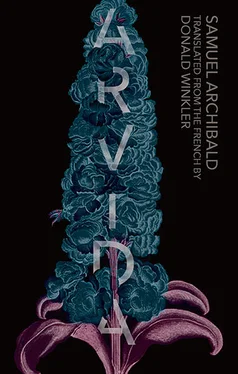“We’ll have to tell everyone never to go up there again.”
Now that he seemed calm, Madame Nazaire was able to say to him:
“You know, if she’s dead, we’ll have to tell the police.”
He turned his back, stretched out his hand to turn down the oil lamp, and grumbled in the half-light:
“She’s not dead.”
She was often seen after that, at the curve in the road from where she looked down on the lake. But from such a distance, she couldn’t be identified with certainty. It could also have been a long black dress hooked onto a post and lifted by the wind.
Michel entered the house, put his suitcase down on a bench in the hall, and walked towards the reading room calling out to Gemma, his big bouquet of flowers in his hand.
She didn’t come. From the dining room, out of the corner of his eye, he thought he could make out her silhouette in the kitchen. He quickened his pace and burst through the doorway, to surprise her. She wasn’t there. He climbed the stairs, and thought he heard her moving around in one of the bedrooms. He negotiated the corridor in long strides, and found all the rooms empty. He repeated her name, loudly, retraced his steps, and passed in front of the bathroom door. He stopped cold.
He had seen her, in front of the mirror, shockingly thin, her face hidden behind her dark hair, which she was brushing in short strokes. But Gemma wasn’t in the bathroom. The brush was there, lying on the dressing table, there were also a few hairs in the bottom of the bathtub, and Michel even detected, hanging in the air, the scent of that heady perfume she adored, but that didn’t suit her.
He looked for her for a long time. He paced the house, opening doors and calling her name. He often glimpsed her slender silhouette at the other end of a room, but it vanished as soon as he fixed his eyes on it. He persevered long after he had realized that this was not a game, long after it had far surpassed the scope of the simply strange, because he didn’t see what else he could do.
One night, dozing in his armchair, he was awakened by a smell. Gemma was there, before him, very close. His head was bowed and he saw her only as far as her chest. She put her hand in his. The hand was neither warm nor cold. It might have been a set of knucklebones enclosed in a thin suede bag. She said:
“Look at me.”
He gave a start, perhaps woke, and made a decision. He rose, went to the bathroom, shaved, took a bath, and lay down on the bed. He had eaten nothing for three days.
The next day, he went down to the village and shopped. He then cleaned the house from top to bottom, removed the shutters that no one had taken off in the spring, and opened all the windows. The rooms had been plunged in darkness for so long that the light, almost gaseous, penetrated slowly, rolling over itself like a drop of blood fallen in water.
Michel began to write and to sleep in the master bedroom. After a few weeks, the villagers began to ask him questions. A few inquired hypocritically after Madame Gemma, others dared to ask him if he intended to leave the manor house and remake his life. As usual, the people in town understood nothing.
Gemma was in the house. With him. She lived now on the periphery of his gaze, behind half-open doors, and in the depths of mirrors.
As long as she was there, he would have no reason to leave.
BLOOD SISTERS II
Colour had not yet returned to the world but the light was already there like a thick coat of primer blearing the surface of things. Frogs were croaking in the pond and birds were beginning to sing in the branches of distant trees. It wasn’t quite day and it was no longer night, it was a part of the day that belonged to no one and her father poked his head through the half-open door to say in a soft voice:
“Wake up, my babies.”
She heard her sister groaning in her bed on the other side of the room. She still couldn’t see anything. Her eyes had adjusted neither to the darkness nor the faint light filtering between the curtains. To her half-shut eyes the room looked like a Polaroid, with all the posters and all the furniture and all the curios in the same place as the night before, except for her sister who had gone to sleep facing her, her arms over her breasts and her delicate fists clasped under her chin as if in prayer, but who was now lying on her back with one arm across her face.
“Lucy, wake up.”
Her sister moaned.
After their father, their mother looked in with her voice that was sometimes piercing and sometimes high-pitched and sometimes low and threatening but never soft. Her mother had a husband and five daughters and two dogs and seven chickens and three rabbits and an indeterminate number of cats. She had a house to run and not much time to be gentle, especially in the morning.
The little girl who really wasn’t one, the adolescent, sat up in bed and began to stretch. There wasn’t a muscle or a nerve or an organ of her body that was not howling that it wanted to go back to sleep but she’d decided it wasn’t to be and she stuck to her guns. She got on all fours and extended her neck and arms and back just like a cat, making little orbits with her shoulders. She arched and de-arched, bringing her head forward and back as far as she could go in each direction.
“Lucie, get up before mama arrives.”
Her sister groaned again.
“Okay, then sleep. Big ninny.”
There was not a muscle not a nerve and not an organ that wasn’t pleading with her to stop this torture and go back between the sheets where she would be sheltered from the cold, where her entrails would stop wrenching and tearing and twisting in her belly like the gears of an archaic machine. But she didn’t stop and didn’t listen to the voices and did not go back under the covers. The adults were always comparing themselves to animals. They said they were strong as horses, smart as mice or sparrows, fearful as hares. They were pig-headed or had faces like cows. They tried to set themselves apart as well. She liked her parents because they often spoke more kindly about animals than people. They respected animals and said while reading the newspaper or watching television, “A dog wouldn’t do that,” or “A horse wouldn’t do that.” But they were exceptional. The others lay in wait for an animal’s instinct to betray it so they could scoff at its stupidity. It seemed to be an ordeal for them to see love in the eyes of a dog or their own expressions on the face of a monkey.
She knew exactly what differentiated men from animals and she knew the difference was very slight and had nothing to do with love or sadness or the capacity of people to feel whatever it was but everything to do with their ability to deny emotions the right to run rampant within them. Man was not the only intelligent creature but he was the only one who could use his intelligence to no longer feel and to no longer be a creature at all. She knew all that and she trained herself not to heed what issued from her heart and her innards. She was training herself this very moment by extricating herself from under the covers despite the supplications of her every cell. Soon she would experience everything but would allow herself to be touched by nothing and she would be not at all animal but totally man, totally woman.
She accused her sister several more times of being dense and dumb for not being able to get out of bed, but their mother didn’t come to shout at them from the bedroom doorway and when the adolescent and her now wakened sister burst into the kitchen, she stopped them short, saying:
“Sit down. What do you want for breakfast?”
“We can’t have breakfast, mama. We’ll be late.”
“No. Papa doesn’t want you to walk today. He’s going to drive you. You want eggs?”
Читать дальше












